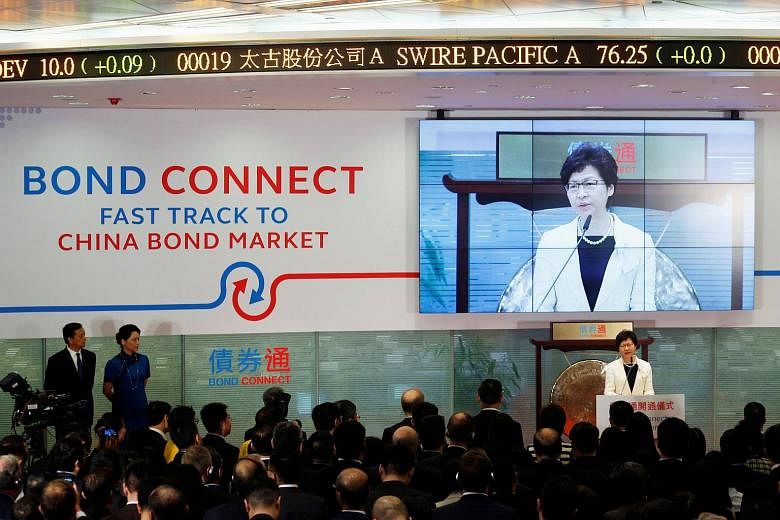China's Bond Connect system opens doors for foreign institutional investors to cherry-pick in a US$700 billion (S$967 billion) corporate securities market where few issues are rated below a lofty AA.
Part of the reason for that is the youth of the market: As recently as 2006, all issues required bank guarantees, so domestic rating agencies graded all corporates AAA. Even now, of the 1,500 bonds of publicly traded companies covered by China's big four agencies, 70 per cent score AA or above - and a whopping 60 per cent are AAA.
By a proprietary Bloomberg metric, however, at least eight of those AAA issues actually were high-yield, with a greater than 0.52 per cent probability of default over the next 12 months. Would a state-owned firm like China National Building Material - which belongs on the third rung of junk, according to the Bloomberg risk monitor - ever be allowed to welsh? The cement maker is rated AAA at home.
Let's not be too cynical: Give China the benefit of the doubt. For one thing, there's little history of delinquency. The nation's first corporate bond default occurred only in 2014.
In addition, more than 85 per cent of corporate issuers are state-owned enterprises, according to a Goldman Sachs Group estimate, and such enterprises have been able to avoid default through local government and bank bailouts.
For those who don't mind doing their own due diligence, Chinese corporate bonds may be attractive. An average AA bond with a five-year maturity yields 5.4 per cent, more than double the 2.65 per cent on its US counterpart, Bloomberg data shows.
Consider, too, that amid alarmist headlines about China's ticking corporate-debt time bomb, companies' ability to service borrowings is getting better.
For 900 publicly traded Chinese companies with a market cap greater than US$100 million, retiring all of their net debt would take an average of 0.25 year of operating income, versus 0.91 three years ago. Deleveraging is far from complete, but it's certainly under way.
We've seen how assiduously China wooed MSCI to include A-shares in its benchmark index. Membership of a fixed-income gauge like the prestigious JP Morgan Global Bond Index could be more gratifying still.
Investors may soon get a more complete picture. Beijing promised to open its bond markets to foreign rating companies this month, so the likes of China National Building Material could have a more realistic grade from Moody's Investors Service or S&P Global Ratings in a year or so. This connection is looking clear.
BLOOMBERG
•This column does not necessarily reflect the opinion of Bloomberg LP and its owners.

